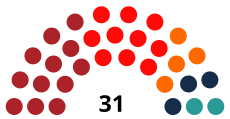Inatsisartut
Parliament of Greenland
| |
|---|---|
 | |
| Type | |
| Type | |
| Leadership | |
| Structure | |
| Seats | 31 |
 | |
Political groups | Government (22)
Opposition (9) |
| Elections | |
| Open list proportional representation with a 2% election threshold[citation needed] | |
Last election | 6 April 2021 |
Next election | 2025 (expected) |
| Meeting place | |
 | |
| Inatsisartut, Nuuk | |
| Website | |
| inatsisartut.gl | |
The Inatsisartut (Template:Lang-kl;[1] Greenlandic pronunciation: [inatt͡sisɑtːʉt] Template:Lang-da), also known as the Parliament of Greenland in English,[2] is the unicameral parliament (legislative branch) of Greenland, an autonomous territory[3] in the Danish Realm. Established in 1979, it meets in Inatsisartut, on the islet of Nuuk Center in central Nuuk.
There are 31 members, who are elected for four-year periods by proportional representation.
History of the parliament
The Parliament of Greenland succeeded the provincial council (Template:Lang-da) on 1 May 1979. The parliament is led by a presidency comprising four members of the parliament, and the chairman. There are 31 members in the assembly.
Speaker
The speaker is the presiding officer of the Inatsisartut. The speaker determines which members may speak, and is responsible for maintaining order. On October 3, 2018, Siumut had Vivian Motzfeldt, the outgoing Foreign Minister, elected. On the 16th of April 2021, Hans Enoksen was elected again.[4][5]
The speaker is nominated by the prime minister immediately following a general election and is confirmed by members; the speaker appoints four deputies.[6]
Current members
Recent results
The most recent elections were held on 8 April 2021.
 | ||||||
|---|---|---|---|---|---|---|
| Party | Votes | % | +/– | Seats | +/– | |
| Inuit Ataqatigiit | 9,933 | 37.44 | +11.66 | 12 | +4 | |
| Siumut | 7,986 | 30.10 | +2.66 | 10 | +1 | |
| Naleraq | 3,252 | 12.26 | –1.29 | 4 | 0 | |
| Democrats | 2,454 | 9.25 | –10.44 | 3 | –3 | |
| Atassut | 1,878 | 7.08 | +1.12 | 2 | 0 | |
| Nunatta Qitornai | 639 | 2.41 | –1.04 | 0 | –1 | |
| Cooperation Party | 376 | 1.42 | –2.69 | 0 | –1 | |
| Independents | 10 | 0.04 | New | 0 | New | |
| Total | 26,528 | 100.00 | – | 31 | 0 | |
| Valid votes | 26,528 | 97.86 | ||||
| Invalid/blank votes | 581 | 2.14 | ||||
| Total votes | 27,109 | 100.00 | ||||
| Registered voters/turnout | 41,126 | 65.92 | –5.94 | |||
| Source: Qinersineq.gl | ||||||
Composition since 1979

See also
- Politics of Greenland:
- Politics of the Faroe Islands (the other constituent country of the Kingdom of Denmark:
- Elections in the Faroe Islands
- Løgtinget, the parliament of the Faroe Islands
- Prime Minister of the Faroe Islands
- Politics in the Kingdom of Denmark:
- Elections in Denmark
- Folketinget, the parliament of the Kingdom of Denmark
- Prime Minister of Denmark (list)
- The unity of the Realm, consisting of Denmark proper, the Faroe Islands, and Greenland
- Other parliaments in the Nordic countries:
References
- ^ "What is Inatsisartut". ina.gl. Parliament of Greenland. Retrieved 18 May 2023.
- ^ "About the Greenlandic Parliament". inatsisartut.gl. The Greenlandic Parliament. Retrieved 28 March 2017.
- ^ * Benedikter, Thomas (19 June 2006). "The working autonomies in Europe". Society for Threatened Peoples. Archived from the original on 9 March 2008. Retrieved 30 August 2019.
Denmark has established very specific territorial autonomies with its two island territories
- Ackrén, Maria (November 2017). "Greenland". Autonomy Arrangements in the World. Archived from the original on 30 August 2019. Retrieved 30 August 2019.
Faroese and Greenlandic are seen as official regional languages in the self-governing territories belonging to Denmark.
- "Greenland". International Cooperation and Development. European Commission. 3 June 2013. Retrieved 27 August 2019.
Greenland [...] is an autonomous territory within the Kingdom of Denmark
- Ackrén, Maria (November 2017). "Greenland". Autonomy Arrangements in the World. Archived from the original on 30 August 2019. Retrieved 30 August 2019.
- ^ "Her er Mútes Naalakkersuisut". Sermitsiaq.AG (in Danish). 16 April 2021. Retrieved 16 April 2021.
- ^ "Múte Egede er ny formand for Naalakkersuisut". KNR (in Danish). Retrieved 24 April 2021.
- ^ "The Presidency of Inatsisartut". inatsisartut.gl. The Greenlandic Parliament. Archived from the original on 27 October 2013. Retrieved 2 February 2016.



